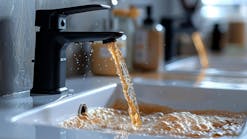The "going green" trend is everywhere these days, clinching the fact that it is here to stay. While there are many great green products and practices out there, "greenwashing" remains a concern. In an effort to jump on the sustainability bandwagon, many companies are eager to tout their products as green and their business as environmentally friendly. With so many claims out there, it is hard to know what "green" really means.
The Water Quality Assn. (WQA) is resolving to help the water industry break through the confusion. The WQA Mid-Year Leadership Conference, held earlier this fall, was all abuzz about the organization’s eco-labeling initiative. According to Tom Palkon, director of product certification for WQA, this program will "include standards with credible metrics for evaluating the sustainability of a product, enable consumers to easily differentiate between products and provide the industry with an eco-labeling product certification program."
The first standards set for launch are for activated carbon and point-of-use filters that use activated carbon, with standards for other water treatment technologies to follow. (For more from Palkon on this initiative, see "Greening Water Quality.")
The new labeling scheme will go a long way in helping consumers identify green water treatment products, but it is the dealers themselves who are crucial in helping their customers understand the environmentally friendly options available to them.
Both environmental and regulatory factors are bringing green technologies — from water reuse to water efficiency — to the forefront. Ongoing droughts in many U.S. states, plus the more widespread problem of worldwide water scarcity, mean water reuse and water efficiency will remain center stage for quite some time. Moreover, regulatory changes, such as the softener bans in California, will require the exploration of newer, greener technologies. The overall message is that we need to conserve natural resources and be smart about how we use them — especially when it comes to water.
It is important for dealers to stay up to date on the latest technologies and keep customers informed of their options. Dealers also have the power to spread the word about conserving water and using green technologies like more efficient softeners or rain barrels. "When It Rains, It Pours" describes how the city of Los Angeles increased awareness of its new rain barrel program. A combination of traditional methods, such as yards signs, brochures and tables at community events, and newer methods, such as social media and blogs, helped the city exceed its goal for program participants. While these efforts were undertaken on a large municipal level, the techniques the city used also could be applied by dealers looking to increase awareness of green technologies or begin offering rain barrels as part of their product lines.
However dealers approach going green, one thing remains important: avoiding the hype of greenwashing, and providing customers with the most accurate, up-to-date information possible.
Download: Here



